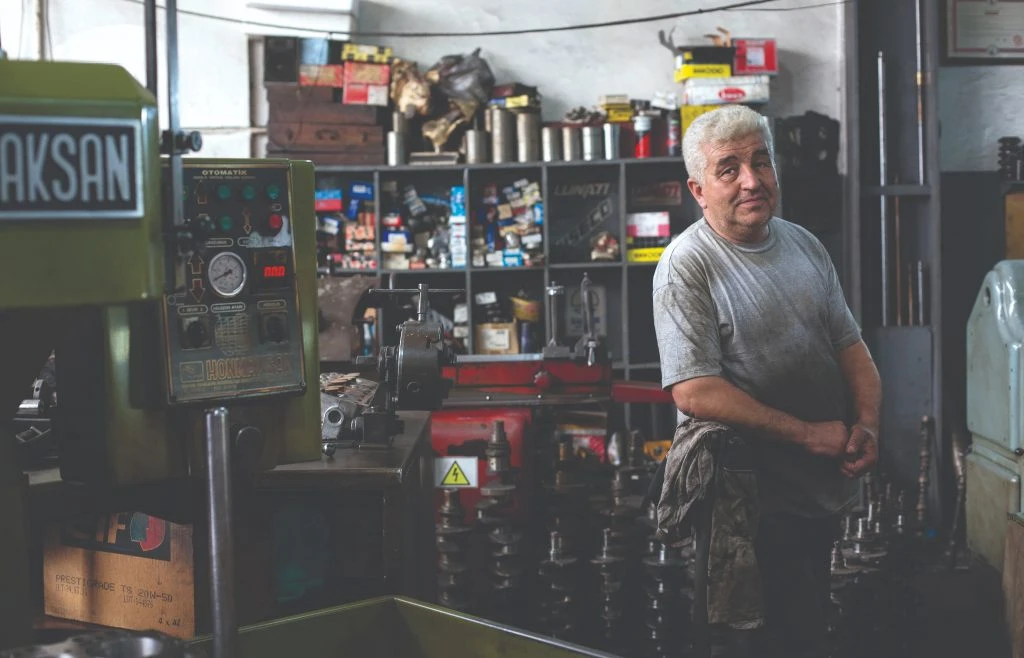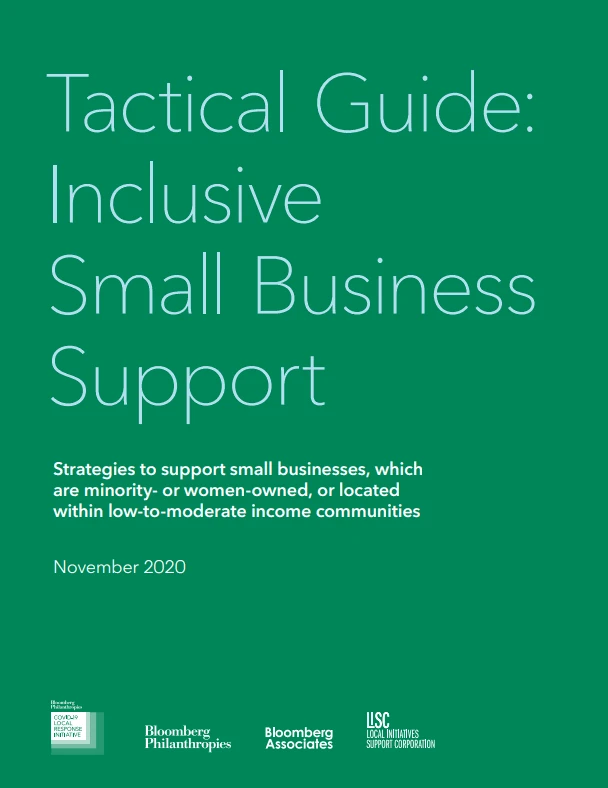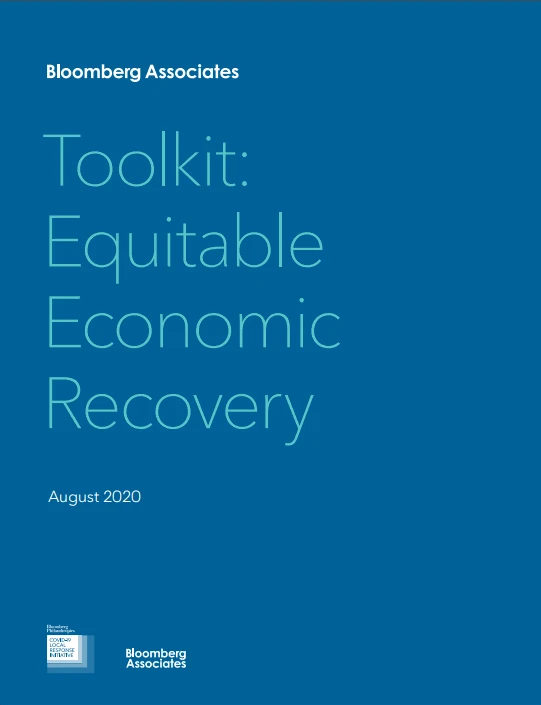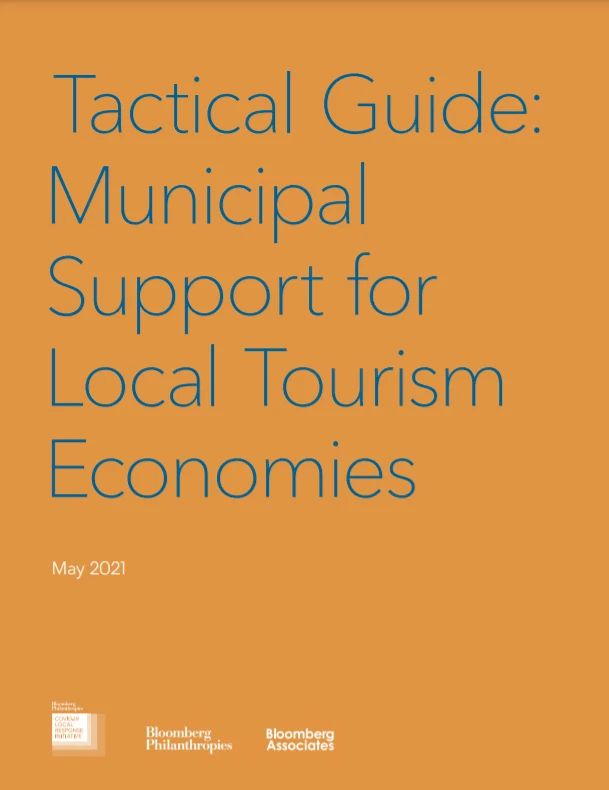Action:
Target support to small businesses in commercial corridors in disinvested neighborhoods. Provide grants to address building needs, connect businesses to technical assistance and workforce development programs, and help businesses leverage other supports to help them grow.
Why:
In this way, you will make neighborhoods more livable, help retain essential services, and support household wealth building.
Case Study
Inclusive Economic Opportunity Districts – Indianapolis, IN
In collaboration with the City of Indianapolis and the Indy Chamber, LISC created “Inclusive Economic Opportunity Districts” in the City’s North Mass and East Washington Street corridors in late 2014. This is a local example of LISC’s national economic inclusion framework, which facilitates data gathering, mapping of existing ecosystems and the creation and implementation of a shared, community-led agenda for inclusive economic growth.
North Mass and East Washington St. are legacy commercial and industrial corridors, surrounded by LMI neighborhoods. The industrial corridors consist of small manufacturers, landscaping companies, building materials suppliers, and other business-to-business service firms.
A primary goal of the program is to revitalize these corridors, support their businesses, create good and accessible jobs, and build identities which will attract new businesses.
The program’s partners work with local community development corporations (CDCs) which help small business owners take advantage of resources, such as Office of Community Services Community Economic Development grants, and connect with local residents looking for work. The CDCs also help businesses looking to move or expand into these corridors to access capital, apply for façade improvement grants, and connect to workforce development services. LISC also works with the CDCs to identify opportunities to deploy its lending capital.
The City has prioritized the corridors for its Community Development Block Grant (CDBG) program. This enabled the CDCs to attract City grants to convert industrial buildings into hubs for arts, artisan manufacturing and small businesses. The City has also prioritized the corridors for Environmental Protection Agency Brownfield Assessment grants, which has enabled the CDCs and businesses to reduce the cost of environmental due diligence.
Based on the success of the North Mass and East Washington Street work, in 2018 the Far Eastside was added as an Inclusive Economic Opportunity District.
In 2019:
- 232 jobs were created from businesses starting, expanding or moving to
- Inclusive Economic Opportunity Districts
- 162 businesses assisted
- 38 businesses moved to Inclusive Economic Opportunity Districts
- 5 brownfields were readied for development
- 21 businesses received façade improvement funding
- 581,302 sq. ft. of commercial space was improved
How to Adapt This Approach:
- Identify priority commercial corridors in LMI neighborhoods
- Identify local CDCs and nonprofits that have connections to the local communities
- Facilitate data gathering, ecosystem mapping, cross-collaboration, and agenda-setting among these groups
- Develop a shared action plan with clear roles and responsibilities for community collaborators
- Work with them to engage local residents, business owners, and community leaders to understand their specific needs and aspirations for the neighborhood
- Help partners implement district marketing campaigns highlighting the district’s unique attributes to attract visitors and shoppers to retail businesses
- Support and invest in partner efforts and provide access to City resources and programs such as CDBG funds, façade improvement funds, and/or workforce development programs
- Advocate for Federal dollars to advance local efforts like Brownfield assessment and remediation
Learn more about the Tactical Guide
Action:
Support local incubators or makerspaces, which offer affordable rents, flexible terms, shared equipment and services, room-to-scale operations, networking events, and communities of peer entrepreneurs.
Why:
Such projects can be catalytic, helping entrepreneurs create businesses and existing businesses to grow, thereby building local wealth. By establishing and preserving affordable spaces for light manufacturing, business incubation, maker/artist studios, and cultural activities, cities can foster quality middle-skill job opportunities for LMI residents.
Case Study
East End Maker Hub – Houston, TX
Urban Partnerships CDC (UP CDC), a nonprofit real estate development company, partnered with TXRX labs, a nonprofit high tech maker space, to develop the East End Maker Hub in a historically marginalized part of Houston with a majority Latinx population.
It offers 300,000 square feet of multi-tenant, multiuse manufacturing and fabrication space, which supports makers, manufacturers, corporate tenants, and other small businesses. It features multiple spaces of varying sizes to target manufacturers and makers looking for affordable long-term rents, collaborative space, and access to equipment.
The hub was funded by HUD Section 108 and CDBG grants, which the project procured from the City. UP CDC also procured an EDA grant. The project received a New Markets Tax Credit allocation through the People Fund, Urban Research Park and McCormack Baron Salazar and also received support from LISC, a CDFI.
TXRX labs, Houston’s largest manufacturing business incubator and accelerator, is the anchor tenant of the East End Maker Hub. TXRX provides access to over $2 million worth of machinery and equipment, classes, and technical support, job training programs.
It focuses outreach on minority-owned manufacturers, makers, and other small businesses located within a three-mile radius of the building. It also sees its role as supporting wealth building in the local community.
As part of TXRX’s Youth Education program, its staff speak at local community events and give presentations at local churches and schools. They also build relationships with local teachers to help them understand the role of manufacturing as a pathway to middle-income jobs. Further, they encourage the students to visit the hub and participate in afterschool programs. Each year, the hub provides job training for 75 adults and hands-on learning for over 500 teenagers.
The hub is projected to have an annual economic impact of $153 million and create 400+ direct and 200+ indirect jobs.

How to Adapt This Approach:
- Identify and support local CDCs and CDFIs with a mission to support local manufacturing/ makers/entrepreneurship
- Engage local communities, entrepreneurs and neighborhood groups, to involve them in the project
- Help them to secure HUD Section 108 funding, New Markets Tax Credits, and other government funding to purchase/renovate a disused/underutilized building in a disinvested neighborhood
- Support land-use changes to facilitate the project
- In pre-development planning and space considerations, strike the right balance between creating a workplace and community asset that contributes to placemaking
- Plan to open doors to the public and forge ties with the local community, catalyzing public understanding of the importance of industrial spaces
- Support community-based organizations providing programs and services to local businesses
- Connect City/regional workforce training and placement programs and prioritize local hiring
Learn more about the Tactical Guide
COVID-19 Economic Response and Recovery
Provide Technical Assistance to Small Businesses
Action:
Create strategies and partnerships that will make your destination more sustainable and inclusive. And tell that story to visitors
Why:
Since COVID-19, travelers, particularly younger travelers, have a heightened awareness of environmental sustainability and social and racial equity. As a result, they are more likely to look for evidence that destinations are taking steps to address these issues.
Background:
Numerous reports and studies have found that the pandemic has reinforced, even accelerated, people’s views on sustainability, with more consumers focused on helping to create a better, healthier world.
For example, 60% of travelers say that their future booking decisions would be influenced by sustainable initiatives at the property, even if it meant spending a modest premium.
Travelers’ behavior, loyalty, and values are also being redefined by the economic downturn, restrictions in day-to-day living caused by COVID-19, and flashpoint events highlighting systemic racism within our communities.
It is widely expected that the pandemic will accelerate the trend of travelers seeking “travel with a purpose,” with 67% of recently polled travelers saying they want their bookings to make a positive difference for communities affected by the pandemic.
Travelers are also now placing greater importance on pre-trip planning.
Destinations can respond to these trends by developing a shared understanding of what it means to be a sustainable destination.
For example, Sedona, AZ engaged the Global Sustainable Tourism Council to conduct a sustainability assessment of its tourism economy.
The goal was to enable the destination to design and target policies, programs, and campaigns which demonstrate sustainable destination management, maximize economic benefits to the host community, and minimize negative impacts on the environment.
Programs could include:
- Sector-wide sustainable guidelines.
- Technical assistance to small businesses to help them adopt more sustainable practices (e.g., relating to energy and water use, single use plastics and recycling, food procurement, laundry operations, and reporting).
- Destination management tools to “nudge” visitors around the city, to manage crowds, and/or to help tourists engage local communities.
- Investments in green infrastructure.
- Communicating the destination’s commitments to travelers.

Case Study
City of Boston
In 2020, the City of Boston drew down $2.5M of CARES Act Federal relief funding to launch a marketing campaign to market the city to Black and Brown residents and visitors.
The campaign’s goals were to “build Boston’s brand as a travel destination, increase awareness and active promotion, and drive visits to Boston from diverse local and regional visitors.“ It was part of the city’s strategy to build back a stronger and more equitable economy.
In particular, the campaign sought to “examine the ways in which Boston communicates about the offerings of the city, and highlight attractions and events that speak to the experiences of people of color.”
The Greater Boston Convention & Visitors Bureau selected two award-winning agencies with deep roots in the city. One was Boston’s oldest, minorityowned and operated marketing communications agency. The other was a Boston-based, minority owned, award-winning creative branding, design,
and advertising agency.
They soon discovered that the city had allowed others to create a narrative of Boston as an all white, masculine, sports- and alcohol- dominated city. Visitors and some residents had low awareness of the city’s vibrant Black neighborhoods, and the contributions of Black and Brown residents to the city.
The campaign featured different Boston neighborhoods with neighborhood maps and guides and short-form videos, as well as social media influencers from some of the city’s oldest Black neighborhoods. It also celebrated Black and Brownowned businesses in local and national media, in order to drive local spend.
Like many campaigns during the pandemic, its primary audience was local residents. However, as travel becomes safer, the city plans to continue its efforts to encourage a wider audience to change their perceptions and, ultimately, actions.
Learn more about the Toolkit
COVID-19 Economic Response and Recovery
Provide Access to Funds and Resources for Tourism Businesses to Adapt
Action:
Provide access to finance and technical assistance to help small, tourism and hospitality businesses pivot, adapt, and capitalize on new demands and opportunities in a postpandemic world.
Why:
Keeping local, small businesses is critical for the recovery of your tourism economy. By helping them develop new online communications and sales channels, create new lines of business, or repurpose and adapt their space, you are helping to create longterm revenue solutions.
Background:
In 2020, U.S. travel spend declined by nearly $500 million and, while the industry improved between April and September, progress stalled in the final quarter of the year due to the continued absence of business travel and another surge in COVID-19 cases.
The travel economies of every city and state were affected. Seventy percent of U.S. metropolitan regions have at least 10% of their workforce in leisure and hospitality, and during 2020, cities in more than 18 states experienced 40+% downturn in travel spending. The impact was felt most by small businesses (with fewer than 500 employees), which make up 99.5% of the tourism sector and 60.6% of employment within the sector. Many of them face a time of extreme liquidity strain and most of them entered the pandemic with very limited cash flow.
Women and minorities have also been hard hit, with women- and minority-owned businesses comprising 63.5% of U.S. accommodation and food services businesses and 46.5% of arts and entertainment businesses.
Given that COVID-19 will probably be around for a long time, many tourism businesses will need to adapt and/or reinvent themselves for “the new normal.”
Case Study
Bellville Downtown District Marketplace
Belleville is a town located between Toronto and Ottawa in Canada. During Canada’s strict lockdown in 2020, the Downtown Belleville Improvement Area (a business improvement district) decided to embark on a project to create an online marketplace called the Downtown District Marketplace.
In just four weeks, the BID launched a website which allowed nearly two-dozen businesses to receive orders for curbside pickup. Today, the website hosts over a thousand products from local businesses, including restaurants, artisan markets, art associations, and galleries. It has attracted more than 50,000 visitors and over 1,000 orders. In fact, the marketplace has been such a success that the BID is no longer supporting it with grant funding.
The BID is currently developing the site to add shipping. Currently, customers can pick up curbside, or merchants manage deliveries themselves.
How the marketplace works
The BID created the marketplace on the Shopify platform. The platform charges the BID $299/month, plus $10/month for a multi vendor marketplace app, which means the BID does not become the merchant.
The BID was fortunate to have two young staff members with the technical skills needed to design a website. They created pages for each local business, which only they could access and edit.
Shopify collects the money from the sales, and the BID pays its merchants every 2 weeks. Each local business is responsible for paying credit card and transaction fees. The BID doesn’t take any commission. The local businesses greatest concern about the marketplace was payment terms. Early on in the project, the BID spent many hours sorting out payments to the local businesses, but it has since managed to automate this process.
Launching the marketplace
The BID launched the marketplace with a teaser campaign, which included VIP access to the first 250 people that signed up for its newsletter. In this way, it was able to gather feedback on issues that early users faced and make adjustments before opening to the general public.
Its subsequent marketing tactics have included social media (paid and organic), digital advertisements, local radio, and press releases sent to local and national media outlets. Local partners have also provided content and written features for the Marketplace.
The BID did not receive support from the city to launch the Marketplace. It did, however, receive funding from a regional marketing board to run a contest on the website — users who spent $50 could win Marketplace gift cards to use on their
next purchase.

How To Adopt This Approach:
The project’s success was based on strong relationships with local businesses
1. Assemble and train a group of 5–10 local business owners, who will become
your ambassadors to get other merchants on board
2. Regularly engage business owners and provide sufficient training about the sales platform, recognizing that different business owners have different levels of digital literacy. This will mean creating step-by-step guides, complete with screenshots on how to add products and make payments
3. Help merchants to become confident selling online. Just as a shop needs an attractive window display, a website needs beautiful photos. Merchants will also have to do their own marketing to drive traffic from their website to the Marketplace, for example, by posting and buying advertisements on social media.

Do:
- Do spend time building the trust and confidence of your member businesses.
- Do regularly engage with your business owners and provide support based on their differing levels of digital literacy.
- Do set aside considerable time at the beginning to sort out payments from Shopify to vendors.
Don’t:
- Don’t assume any knowledge. Create stepby- step guides, and share information on how businesses can take good photographs, buy ads, and market their businesses on social media.
Learn more about the Tactical Guide
Action:
Leverage the expertise, resources and networks of Community Development Financial Institutions (CDFIs) to support LMI neighborhoods and MWBEs.
Why:
By partnering with CDFIs, banks, and philanthropy to develop tailored loan programs, you can extend your impact, even during a time of austerity.
Case Study
New York Forward Loan Fund (NYFLF) – New York
NYFLF is a new $100M loan program to help small businesses, nonprofits, and small landlords in the state reopen following COVID-19 closures. Loans are focused primarily on small MWBEs and can cover reopening costs (e.g. cleaning supplies, inventory, refitting for social distancing protocol).
Eligible small businesses must have annual gross revenues of less than $3M, fewer than 20 employees, and have not received other SBA COVID-19 relief (PPP, EIDL). Loans must be repaid over a 5-year term with interest.
The fund is administered by LISC New York and loans are made by five CDFIs: Accion East, Community Preservation Corporation, National Development Council, Pursuit, and TruFund Financial Services. The CDFI partners also offer technical assistance for loan recipients.
Since the fund was designed to help small businesses with the costs of reopening, the fund prioritized deploying capital to industries and regions based on their designated reopening dates.
So far, just over $2 million has been awarded to 61 businesses and small landlords. Of these recipients, 54 were MWBEs, and two were veteran-owned businesses. The loan fund continues to accept and process applications, with 60% coming from MWBEs.

How to Adapt This Approach:
- Support the creation of a targeted loan fund by bringing together an investor collaborative poised for rapid deployment. Likely members often comprise CDFIs, banks, high networth individuals, public finance bodies and philanthropic institutions
- Prioritize MWBEs and LMI entrepreneurs in loan eligibility guidelines
- Work with CDFIs to craft and provide culturally relevant and geographically-specific technical assistance programming to MWBEs
- Prioritize low cost, flexible capital products that include offerings for permanent working capital, leasehold improvements, equipment, construction, acquisition and debt refinancing
- Support community-based organizations to help connect MWBEs in their networks to loan opportunities and provide assistance with applications
Learn more about the Tactical Guide
COVID-19 Economic Response and Recovery
Issue Municipal Bonds to Offer Community Loans
Background:
Access to capital is one of the biggest challenges facing low-income people and communities of color. This problem is particularly acute for minority-owned businesses, which face greater challenges accessing capital than white-owned businesses. It also is a problem for people of color looking to obtain mortgages and grow wealth. Black Americans are denied loans at a disproportionately higher rate with some research showing they are denied at twice the rate of white Americans.
Current criteria for issuing loans include determining if people in the applicant’s social networks pay back loans on-time. Even when people of color are granted mortgages, they often end up paying more than their white peers. This impacts their ability to start businesses and obtain mortgages to buy homes and build wealth. And banks are hesitant to issue loans to small businesses without capital and individuals without an established credit history.
Action:
Cities should consider issuing bonds for the explicit purpose of backing and facilitating access loans for local businesses and mortgages for people who would otherwise not have access to financing. By issuing municipal bonds, cities could bring significant capital to be deployed directly to residents and businesses, using objective scoring driven by the city’s policy goals.
While cities are under enormous financial pressure which makes the issuance of additional bonds challenging, research has shown that increased spending during a recession is the most effective way to rebound.
Cities can either issue the loans directly or work with small local banks or CDFIs to do so. Cities will have to be cautious with implementation. Financial counseling will be necessary to ensure that accessing additional funds is right based on each individual’s circumstances, and a city may not have the requisite financial expertise to implement the program.

How To Adapt this Action:
Although a model doesn’t yet exist for this program, this action draws on a proposal for A Homestead Act for the 21st Century by Professor Mehrsa Baradaran from University California at Irvine.
Based on this proposal, cities should follow the steps below:
- Evaluate needs in disinvested communities
- Host community forums and survey people who would want to start a business with available funding
- This outreach must focus on low-income and communities of color.
- Determine how to issue loans to companies
- Cities can directly issue the loans, but this will require significant financial expertise.
- Alternatively, cities can work with local banks and financial institutions (e.g., Black-owned banks, credit unions) and provide backing for loans to be issued to low-income and communities of color based on relevant criteria.
- Neither model means that cities or banks should issue risky loans. Instead, they can prioritize criteria that are indicators of success (e.g., sound business plan, identified service gaps in communities), over ones that often cause Black and other minority-owned businesses to be rejected for funding at higher rates (e.g., lack of credit history).
- Explore potential partners for action to maximize impact and minimize risk
- Many philanthropic partners are dedicated to increasing access to capital for minority-owned businesses. Some may be willing to match funds.
- Minimize risk by seeing if local non-profits, education institutions, community leaders, and businesses will serve as guarantors on loans.
- Determine criteria for issuing loans to businesses and individuals
- Do not use an applicant’s social network to determine loan eligibility. Instead, focus on non-discriminatory factors (e.g., history of paying bills on-time, strength of business plan).
- Engage non-profits, CDFIs, and other community-based organizations to identify gaps in traditional lending sources.
- Launch pilot with alternative funding source (e.g., not municipal bond) to demonstrate effectiveness of loan offerings
- Given the unique nature of offering loans based on a separate set of criteria, a city should launch a smaller pilot (e.g., loans to 5-10 businesses based on the new scoring criteria) to demonstrate success.
- Consider type of bond issuance
- Although revenue bonds, tied to businesses’ potential revenue, may make sense given the bond’s purpose, cities should decide what type of bond issuance (e.g., general obligation bond) makes the most sense given their unique financial circumstances.
- Review and follow the rules set out by the Municipal Securities Rulemaking Board.
- Note: these rules are relevant for all municipal bond issuances.
- Work with city council to obtain approval for bond issuance
- It will be critical to get your city council’s backing for this project. Using researched alternative criteria should not lead to a lower default rate, but there is always inherent risk when issuing loans. Having the support of your city council and Mayor for this will ensure that you are not criticized in the short-term if there are loan repayment issues.
- Leverage pilot findings to show the potential impact of the full bond issuance.
- This bond issuance can help facilitate access to funding for several populations, including:
- Low-income, Black, and other residents of color who need homeowner loans
- Mid-size business support loans (as proposed in this toolkit)
- Note: local circumstances will dictate how loans can be issued. Given states often prevent cities from explicitly considering race, many will want to prioritize residents based on income tracts, or other relevant measures (e.g., access to capital) that will help the city’s most vulnerable residents.
- Issue bonds and launch a marketing campaign to make communities aware of the program and garner interest, with a particular focus on low-income and communities of color.
- Leverage community partners, nonprofits active in these communities, and other relevant community organizations.
- Offer information on this program at community gatherings (e.g., entrepreneurship meetups, financial empowerment center 1-1 meetings)
- Track progress and revise program as necessary.

Benefits:
- Provides capital to people who may not be able to receive it (and at lower rates)
- Stimulates demand in the local economy (e.g., providing capital to residents to purchase homes)
Risks:
- Requires financial expertise to implement
- Assumes additional financial risk during a period of economic crisis
Impact: High
Implementation time: Low
Cost: High. Issuing the loans will require money to be set aside for the program, although repayment should enable the city to recapture investment. Some FTE will need to run the program, though vetting of loans should be done by professionals.
Learn more about the Toolkit
Action:
Create a preference/discount for local businesses in the City’s procurement process and a separate program for MWBEs. Connect local businesses to technical assistance so that they can scale and successfully compete for contracts.
Why:
In this way, you will build local supply chain capacity, build pathways to wealth creation, and keep money local.
Case Study
Local Business Enterprise Program – San Francisco, CA
The City of San Francisco implemented a local business enterprise preference program that is designed to increase the number of government contracts going to local small businesses in the city.
It was carefully enacted to comply with state and federal contracting laws and accompanied by strong technical assistance. (It was created following a ruling that the previous local business preference program had violated a local ordinance prohibiting discrimination on the basis of race.)
Each year, the Mayor sets a goal for the City, and the City provides bid discounts, set-asides, and subcontracting opportunities to make it easier for
local businesses to win contracts. The program also created a Human Rights Commission, which seeks to grow minority-business engagement.
Local businesses can receive a 10% discount on government contract bids. (This discount was chosen following a disparity study, which analyzed the lower prices that could be provided by larger corporations.) They must:
- Have average gross annual receipts during the previous three years that do not exceed several set limits: (1) public works/construction — $14 million; (2) specialty construction contractors — $7 million; (3) goods/materials/equipment and general services — $7 million; (4) professional services and architect/engineering — $2.5 million; and (5) trucking — $3.5 million.
- Maintain their principal place of business in the city and have a majority of principals based in that office
- Pay at least 51% of their payroll taxes to the City
- Become certified with the program
The City provides significant technical assistance and facilitates connections to other entrepreneurs during the certification process. In this way, it seeks to ensure that certified businesses are able to compete successfully and win business.
Local businesses may also be able to benefit from the City’s Surety Bonds program, which was included in the Equitable Recovery Tactical Guide.
Additional Example:
City of Chicago procurement services. Also see here.

How to Adapt This Approach:
- Decide the type of preference you want to provide (discount vs. set-aside)
- How you do this may be dictated by state law. Some states forbid specific set-asides for local contracts. If your state has strict rules, you should consult your City attorney. To be compliant, you may need to frame this action as a preference for “familiarity with the local environment”
- Assess the current value of government contracts and set a target for how much spend should be prioritized for local small businesses
- Discuss the proposed program with local business leaders to get feedback
- Establish a clear definition of a local small business (e.g., size/revenue limit, majority of employees/ principals live in the city)
- Create strong enforcement mechanisms to hold companies accountable to any requirements regarding subcontractors. These should include fines and the ability to terminate contracts
- Review the proposals/language with the City attorney, administrator, and council; as well as local business leaders and other key stakeholders
- Identify and recruit nonprofit, corporate, and other partners that can provide technical assistance to certified businesses
- Secure buy in from City/county/transit authority/ board of education/other procurement teams to:
- Create and publish rolling lists of bid opportunities; and
- Assess each organization’s procurement practices, to see how barriers can be removed and/or contracts can be divided up
- Launch an outreach effort to familiarize local businesses as well as partners, which can support and provide technical assistance to local businesses
- Track metrics on program performance with biannual sharing of data (value of contracts won)
Learn more about the Tactical Guide
Action:
Help small businesses to pivot, adapt, and capitalize on new opportunities in a COVID-19 world.
Why:
Keeping spending local is critical for economic recovery. By helping businesses meet the needs of surging resilient sectors, develop new sales channels, or create new lines of business; you are creating longer term revenue solutions than subsidies and loans.
Case Study #1
Personal Protective Equipment (PPE) Grant and Procurement Fund – Baltimore, MD
In April 2020, the Baltimore Development Corporation (BDC) established two funds to help Baltimore manufacturers meet local demand for PPE by frontline workers and residents.
BDC created a $150,000 PPE Grant Fund to help manufacturers off-set costs to convert operations to PPE production. The fund awarded grants of up to $15,000 to fund equipment modifications, materials, and labor associated with the manufacturing of specific PPE needs identified by public health officials.
BDC’s ability to engage local manufacturers rapidly was aided by the Made In Baltimore program, which had built communication channels and trusted relationships prior to the pandemic. The program helped to identify and vet which businesses would be able to handle a rapid emergency pivot and response.
Critically, the City allocated $400,000 for a Local Procurement Fund to purchase locally made PPE for frontline City workers. The fund was administered by BDC, which streamlined the procurement process, thereby creating immediate demand for makers and kept City procurement dollars local.
In terms of impact:
- The grant fund supported 15 businesses, 53% of which were women-owned and 33% minority owned. It supported the production of 84,000 masks, 30,000 face shields, and 33,000 gallons of sanitizer.
- The procurement fund contracted 6 businesses, 50% of which were minority-owned or led. It procured 45,000 face masks, 2,500 face shields, and 16,200 isolation gowns.
Case Study#2
Resurgence Small Business Fund – Atlanta, GA
In August 2020, Invest Atlanta, the City’s economic development authority, launched a $17 million fund providing grants to small businesses trying to safely reopen and adapt to the COVID-19 environment.
Eligible applicants can be awarded up to $40,000 and an additional $10,000 for technical assistance in finance, legal, workforce, and technology from 13 business support organizations contracted by the City.
The Resurgence Small Business Fund is weighted towards businesses that are in lower-income communities, MWBEs, long-term growth sectors, longevity of business in Atlanta, those that have not received other COVID-19 relief, and businesses who have demonstrated planning for reopening and adaptation to COVID-19.
It is funded through the CARES Act, and grants are provided on a reimbursable basis.

How to Adapt This Approach:
- Assess the needs of small businesses in the community with a particular focus on which groups of small businesses and neighborhoods are facing the greatest challenges
- Identify the adaptation need/opportunity (e.g., setting up an e-commerce website, retooling equipment to produce PPE, adapting outdoor seating for winter months, etc.)
- Identify which small businesses the program will be designed for. Determine if the fund will focus on supporting all MWBEs; businesses located in LMI areas; a specific sector or business type or some other criteria of need
- Identify and develop philanthropic and/or corporate partners to financially support the program. Leverage City funds to draw in this outside match
- Work with a local CDFI or other nonprofit partner to administer the program, or manage the program directly
Create the program parameters (loans, grants, size, use, terms, eligibility criteria, etc.) based on the City’s policy goals, input from program partners and local stakeholders. Examples of program parameters: Baltimore PPE Fund, Atlanta Resurgence Fund - If applicable, leverage the City’s procurement powers to purchase goods and services from businesses who receive support from the program
- Partner with trade groups, local/ethnic chambers, and other business organizations, which are trusted partners in the communities where the program is focused, to lead outreach, and promote it
- Leverage technical assistance partners to help targeted small businesses apply to the fund
- Maintain a reasonable (e.g. 3+ weeks, include pre-noticing, not first come first serve) window for application submission. Assemble an inclusive application review committee to make award decisions.
- Evaluation criteria could include:
– MWBEs
– Businesses that did not receive CARES Act or other COVID-19 relief funding
– Businesses located in LMI communities
– Businesses with a plan to reopen or adapt to the post-COVID environment
– Length of time operating in the city
– Sector - Add all applicants into a centralized business support database/client relationship management tool (CRM) to coordinate future support
- Provide wrap around technical assistance to businesses who receive funds as well as those who do not
- Track and publish KPIs on a regular basis. Include aggregated demographic and neighborhood data on applications and awards. (See KPIs section)
- Keep partners, particularly neighborhood stakeholders and local business groups updated on progress and any challenges
- Track lessons learned and incorporate into future programming
Learn more about the Tactical Guide
Action:
Launch, or shine a spotlight on, programs that promote and connect MWBEs to new business-to-consumer (B2C) and business-to-business (B2B) opportunities, including national supply chains.
Why:
In this way, you will showcase local talent, raise awareness and local pride, and support local small business growth and jobs.
Case Study
ORIGINS – Pittsburgh, PA
In 2016, a CDFI, Bridgeway Capital, launched the Creative Business Accelerator to help regional creatives — craftspeople, makers, designers, and artists — participate in equitable economic development.
It connects emerging and established creative businesses to affordable and flexible spaces at 7800 Susquehanna, Bridgeway’s 150,000 square foot multi-tenant maker/manufacturing hub, as well as other locations across the region.
In 2019, the Creative Business Accelerator launched a business support program called ORIGINS, which celebrates and elevates local Black creatives. Further, it provides additional layers of flexible capital and technical assistance.
The ORIGINS program offers peer-to-peer learning cohorts, yearlong residencies, specialized coaching, opportunities to connect to new customers, and annual exhibitions. The ORIGINS website showcases Black entrepreneurs starting and expanding creative businesses. In March 2020, the program hosted an inaugural exhibition at Concept Art Gallery, a prominent local venue. Many of the highlighted products were then sold at the PG&H store, a downtown retail space cosponsored by the Creative Business Accelerator and the Pittsburgh Downtown Partnership.
The ORIGINS program offers an annual residency for three local Black creative entrepreneurs. One of the residency spaces is a 750 square foot unit at Case Study: ORIGINS – Pittsburgh, PA Bridgeway’s 7800 Susquehanna Street building. It serves emerging Black makers and manufacturers looking for their first business space.
Additional Example:
Metro Atlanta Chamber of Commerce, THEA network

How to Adapt This Approach:
- Consider opportunities to shine a spotlight on local minority, immigrant, or other LMI small business groups
- Identify and reach out to local and national organizations that have aligned missions (such as the Urban Manufacturing Alliance or an ethnic chamber)
- While it might not be possible to replicate all the building blocks of the ORIGINS program, consider what is possible
- Use existing tactical guides, such as UMA’s Toolkit: How to Develop a Locally-Made Brand Platform.
- Provide access to dynamic City venues for exhibitions and popups, as well as City social media accounts
- Reach out to, and partner with, e-commerce platforms (such as Etsy and Amazon), and regional and national buyers that are courting makers and supporting the Black Lives Matter movement (such as Walmart and Levis)
- Also, reach out to potential sponsors and ambassadors/local celebrities
Learn more about the Tactical Guide
COVID-19 Economic Response and Recovery
Give Preference to Local Businesses for City Contracts
Problem:
Local businesses in particular have been devastated by COVID-19. One in four small businesses have considered closing due to the pandemic, and many others are facing significant challenges, unlike anything they’ve experienced. City contracting is a powerful tool for driving local demand but small businesses are often unable to compete for contracts because of a lack of awareness about the contracts or the bid process, insufficient funds to compete, and/or concerns about reporting requirements.
Action:
The City should provide a preference and/or discount for local contractors in its procurement process. By increasing the amount of purchasing at local firms, this action will help maximize the local multiplier effect which is critical, particularly during the deepest parts of the recession. A similar but distinct program should be created for minority-owned businesses, given the persistent disparities. However, this action will only be successful if it is done in conjunction with several others included here, including creating a more entrepreneurial ecosystem, providing funding to help scale, and actively reaching out to prospective local businesses.
Case Study
San Francisco, CA: Local Business Enterprise Program
The City of San Francisco has implemented a local business enterprise (LBE) preference program that is designed to increase the number of government contracts going to local small businesses in the city. The program — enacted carefully to be in accordance with state and federal contracting laws — enables local small businesses to compete for contracts. The local business enterprise preference program was accompanied by strong technical assistance. It was implemented after a 2004 State Superior Court decision ruled that the previous local business preference program had violated Proposition 209, a local ordinance prohibiting discrimination based on race.
The new local business preference program was formed with this context in mind and focuses on goals for engaging local businesses. The Mayor sets a goal for the City every year and the City provides bid discounts, set-asides, and subcontracting opportunities to make it easier for local businesses to win contracts. There is also a Human Rights Commission which is focused on increasing minority-business engagement.
San Francisco created a free LBE certification process to determine eligible businesses. The city provides a 10% discount on bids for government contracts. The 10% threshold was chosen after the city conducted a disparity study to determine an appropriate rate to counteract lower prices that larger corporations may be able to provide.
To be certified, a business must maintain their principal place of business within City limits and have a majority of principals based in that office. They must also pay at least 51% of their payroll taxes to the City to demonstrate that a majority of their employees are based in their city. The City defines eligible businesses as local small businesses if their average gross annual receipts in the previous three years do not exceed several set limits: (1) public works/construction – $14,000,000; (2) specialty construction contractors – $7,000,000; (3) goods/materials/equipment and general services – $7,000,000; (4) professional services and architect/engineering – $2,500,000; and (5) trucking – $3,500,000. A City office has been given responsibility for review and enforcement and review of these limits. The City has also linked this initiative with its Surety Bonds program to enable small businesses to have a better chance of winning government contracts (this action is included later in the toolkit).
One of the biggest challenges that the City has encountered is ensuring that small businesses are able to complete contracts. Some business owners have never applied for a government contract, nor completed a large-scale project. To address this, the City provides significant technical assistance during the certification process and facilitates connections to other entrepreneurs who can provide insights into this work.
Other Examples:
Chicago also has several programs to support local businesses and advantage them during government procurement processes. The Mid-Sized Business Initiative (MBI) is designed to enhance procurement opportunities for midsize businesses to work with Chicago. The program sets aside certain construction contracts to be made exclusively available to qualified, midsize, local businesses. There are two tiers of contracts: MBI-1 projects with an estimated value of between $10 and $20 million and MBI-2 which are $3 and $10 million in size. To qualify, a business must meet several requirements, including qualifying as a midsize business. This program focuses on construction, but the city has also created a non-construction version, the Non-Construction Mid-Sized Business Initiative (NMBI).

How To Adapt this Approach:
- Determine the type of preference your city wants to provide (e.g., discount in scoring vs. actual set-aside in terms of % of contract)
- Assess the percentage of current business (in terms of contracting dollars) that goes to government contracts and set a target for how much spend should be prioritized for local small businesses.
- How your city does this may be dictated by state law. Some states forbid specific set-asides for local contracts. If your state has strict rules, you should consult your city’s attorneys. Some cities may need to frame this action as a preference for “familiarity with local environment” to be compliant with state regulations.
- Discuss with local business leaders to get feedback on the proposed program
- Draft administrative code language for local preference program (See template in resources section)
- Be sure to review with the city’s attorney and other officials
- Have strong enforcement mechanisms to hold companies accountable to requirements regarding subcontractors. This should include fines and the ability to end the contract.
- Establish parameters for the definition of a local business (e.g., majority of employees/principals based in the city). Determine which businesses are eligible based on size, revenue limit by industry, etc. These limits will vary according to local circumstances.
- Review the language with city council, city administrators, local business leaders, and other key stakeholders to confirm that it is satisfactory
- After passing, launch an outreach effort to familiarize local businesses and support them in their application process
- Reach out to relevant businesses and launch a communications effort to notify businesses of the program
- Establish a procedure to actively contact businesses about contracts that may be suitable for them
- Assign responsibility to government officials – and hire if necessary to augment existing staff – to provide technical assistance
- Track metrics on program performance with biannual sharing of data. (See template in resources section)

Risks:
- Raises concerns among larger businesses that compete with small and local businesses
- Needs to be accompanied by proper technical assistance for local businesses (e.g., access to capital, technical expertise) to ensure they are able to fully leverage opportunities
- Can cause problems for businesses looking to compete in surrounding communities (if all implement this)
- Could lead to higher cost of goods and services due to preferences which may mean more expensive suppliers, wages, etc.
Benefits:
- Keeps government spending local, reducing leakage and increasing overall economic activity in the city
- Supports local businesses and enables them to compete for government contracts
- Provides structured mechanisms for local businesses to obtain a reasonable advantage in contracting
Impact: Medium
Implementation time: Medium
Cost: Low. The preference program itself is not expensive, although it may require several FTE to provide technical assistance and oversight.



